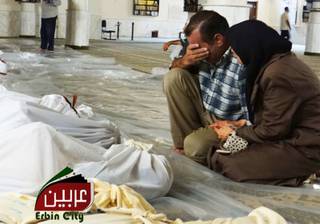Wednesday, Aug. 28, 2013 | 2:25 p.m.
The Obama administration said Wednesday it would take action against the Syrian government even without the backing of allies or the United Nations because diplomatic paralysis must not prevent a response to the alleged chemical weapons attack outside the Syrian capital last week.
New requests for the United Nations to authorize military action in Syria may have complicated the Obama administration's plan to take retaliatory action on the purported poison gas attack east of Damascus that U.S. officials claim was carried out by President Bashar Assad's forces.
But a State Department spokeswoman said possible U.N. rejection of the U.S. plan — most likely led by Russia — won't slow the administration.
"We cannot be held up in responding by Russia's intransigence — continued intransigence — at the United Nations," Marie Harf said. "The situation is so serious that it demands a response."
The U.S. has not publicly presented proof that Assad's government used deadly chemical weapons near Damascus last week. Even so, U.S. officials, including Vice President Joe Biden, have pointed a finger squarely at Assad. The administration was planning a teleconference briefing Thursday on Syria for leaders of the House and Senate and national security committees in both parties, U.S. officials and congressional aides said.
U.S. intelligence intercepted lower-level Syrian military commanders' communications discussing the chemical attack, but the communications don't specifically link the attack to an official senior enough to tie the killings to Assad himself, according to three U.S. intelligence officials. They spoke on condition of anonymity because they were not authorized to discuss the intelligence publicly.
The White House ideally wants intelligence that links the attack directly to Assad or someone in his inner circle, to rule out the possibility that a rogue element of the military decided to use chemical weapons without Assad's authorization.
That quest for added intelligence to bolster the White House's case for a strike against Assad's military infrastructure has delayed the release of the report by the Office of the Director for National Intelligence laying out evidence against Assad. The report was promised earlier this week by administration officials.
The CIA and the Pentagon have been working to gather more human intelligence tying Assad to the attack, relying on the intelligence services of Jordan, Saudi Arabia and Israel, the officials said.
Both the CIA and the Defense Intelligence Agency have their own human sources — the rebel commanders and others who cross the border to brief CIA and defense intelligence officers at training camps in Jordan and Turkey. But their operation is much smaller than some of the other intelligence services, and it takes longer for their contacts to make their way overland.
Britain added a hurdle to deliberations about a military strike on Wednesday when it went to the U.N. Security Council with a draft resolution that would authorize the use of military force against Syria. This, as momentum seemed to be building among Western allies for a strike against Syria.
The British draft resolution would authorize "all necessary measures under Chapter 7 of the U.N. Charter to protect civilians from chemical weapons." Chapter 7 allows the use of international armed force to back up U.N. decisions.
The draft seemed doomed before it was proposed. As expected, the five permanent members of the security council failed to reach an agreement as Russia reiterated its objections to international intervention in the Syrian crisis. Russia, along with China, has blocked past attempts to sanction the Assad government.
Russian Foreign Minister Sergey Lavrov has said that the use of force without a sanction of the U.N. Security Council would be a "crude violation" of international law and "lead to the long-term destabilization of the situation in the country and the region."
Syria, which sits on one of the world's largest stockpiles of chemical weapons, has denied the charges. Moreover, Syria's U.N. ambassador, Bashar Ja'afari, is demanding that United Nations experts investigate three alleged chemical weapons attacks against Syrian soldiers. He said the attacks occurred on Aug. 22, 24 and 25 in three suburbs of the Syrian capital and dozens of soldiers are being treated for inhaling nerve gas.
The draft U.N. resolution was an effort to bolster British Prime Minister David Cameron's case that a military action is needed. Cameron has called an emergency meeting of the British Parliament on Thursday to vote on whether to endorse international action against Syria.
He's promised British lawmakers he would not go to war until chemical weapons inspectors had a chance to report back to the world body about their findings. That means British involvement in any potential strike wouldn't occur until next week at the earliest.
Certain members of Congress are expected to get a classified U.S. intelligence report laying out the case against Assad. An unclassified version is to be made public. Officials say it won't have any detail that would jeopardize sources and methods.


Join the Discussion:
Check this out for a full explanation of our conversion to the LiveFyre commenting system and instructions on how to sign up for an account.
Full comments policy